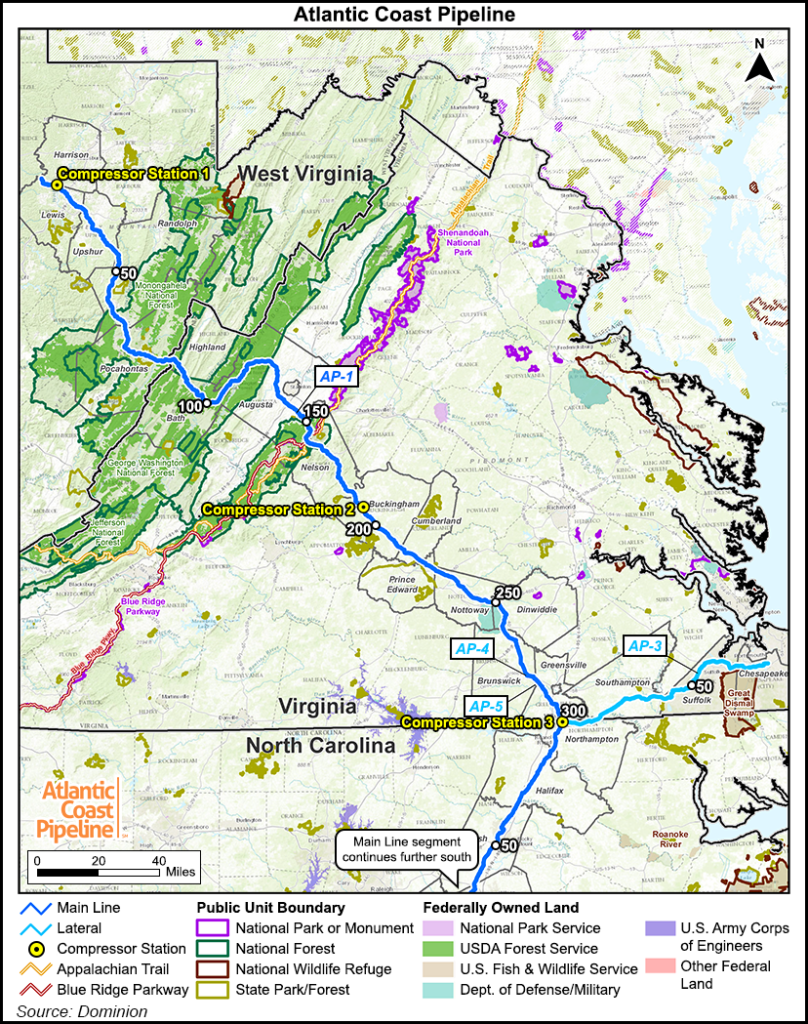NGI Archives | NGI All News Access | NGI The Weekly Gas Market Report
ACP’s Appalachian Crossing Still in Limbo as Fourth Circuit Denies Rehearing
The U.S. Court of Appeals for the Fourth Circuit late Monday denied an Atlantic Coast Pipeline LLC (ACP) petition to rehear a December ruling that overturned key federal approvals for the project, another legal setback that could see the company take its case to the U.S. Supreme Court.

The petition for an en banc rehearing sought to overturn a December ruling by a three-judge panel for the Fourth Circuit that found the U.S. Forest Service (USFS) authorizations for ACP to cross the George Washington and Monongahela national forest along the Virginia/West Virginia border violated federal law. The court also tossed ACP’s permit to cross the Appalachian National Scenic Trail.
Lead project sponsor Dominion Energy Inc. has argued that the Appalachian Trail decision in particular is “at odds with the consensus of the U.S. Department of the Interior, U.S. Department of Agriculture, National Park Service” and the USFS.
The petition, filed earlier this month by ACP and the USFS, keyed in on the Appalachian Trail issue as particularly important since it “may preclude the construction of infrastructure for any pipeline across all federal lands traversed” by the trail.
“The panel’s holding also calls into question the validity of dozens of Forest Service permits for electrical transmission lines, telecommunications sites, municipal water facilities, roads and grazing areas,” the petitioners wrote.
Without an opportunity to make its case to the full Fourth Circuit, Dominion will now turn to the highest federal court for relief as it works to reassure investors and prevent further delays for ACP, a 600-mile, 1.5 Bcf/d greenfield pipeline that has faced relentless opposition in its quest to connect more Appalachian Basin gas to Southeast and Mid-Atlantic markets.
Dominion expects an appeal to be filed with the Supreme Court within 90 days, according to spokesman Karl Neddenien, who said the company is also pursuing “legislative and administrative options” discussed during its recent 4Q0218 earnings call.
During that call, management said it now expects partial service for the project to begin in late 2020, with full service sometime in early 2021. Costs for the project have also grown to $7.0-7.5 billion, not including financing, according to Dominion, the lead ACP stakeholder at 48%.
“We are confident that the U.S. Departments of Interior and Agriculture have the authority to resolve the Appalachian Trail crossing issue administratively in a manner that satisfies the court’s stated objection and in a timeframe consistent with a restart of at least partial construction during the third quarter,” Neddenien said. “We will continue to work to resolve the outstanding biological opinion issue as well as the Appalachian Trail issue and continue to believe, as a result, that at least partial construction will recommence in the third quarter of 2019.”
Project cost and timing guidance provided during the recent earnings call “fully contemplated the possibility of an unsuccessful en banc request,” the spokesman said. “…Dominion Energy remains confident in the full completion of the Atlantic Coast Pipeline along the entire 600-mile route.”
According to analysts at ClearView Energy Partners LLC, the ACP construction timetable could be jeopardized by the latest court order. The project’s updated schedule was already “contingent on a lot of things going right,” including the full Fourth Circuit overturning the December ruling.
Even if the Interior Department and ACP “seek Supreme Court review immediately, the standard briefing schedule would not guarantee the nation’s highest court would make a decision whether to hear the case before it adjourns for the summer,” ClearView told clients. “There is also no guarantee the Supreme Court would take the case.”
ACP faces other legal hurdles to restarting construction with separate approvals from the U.S. Fish and Wildlife Service also in limbo, ClearView noted.
Monday’s Fourth Circuit decision is of keen interest to Mountain Valley Pipeline LLC (MVP), a 300-mile greenfield gas project with a similar route to ACP and some of the same legal vulnerabilities. MVP intervened in the petition for rehearing in ACP’s case. While MVP obtained its grant to cross the trail from the U.S. Bureau of Land Management (BLM), executives for MVP developer Equitrans Midstream Corp. said during a recent conference call that they were closely monitoring the case as the Fourth Circuit’s opinion could apply to the BLM as well.
“Our situation is not directly the same as ACP’s,” said Equitrans CEO Thomas Karam. “But clearly, when you’re talking about crossing the Appalachian Trail, we’re keeping our eye very closely attuned to that.”
ACP is a joint venture of Dominion, Duke Energy Corp., Piedmont Natural Gas and Southern Company Gas. MVP is a joint venture of Equitrans, NextEra US Gas Assets LLC, Con Edison Transmission Inc., WGL Midstream and RGC Midstream LLC.
© 2024 Natural Gas Intelligence. All rights reserved.
ISSN © 2577-9877 | ISSN © 1532-1266 | ISSN © 2158-8023 |
